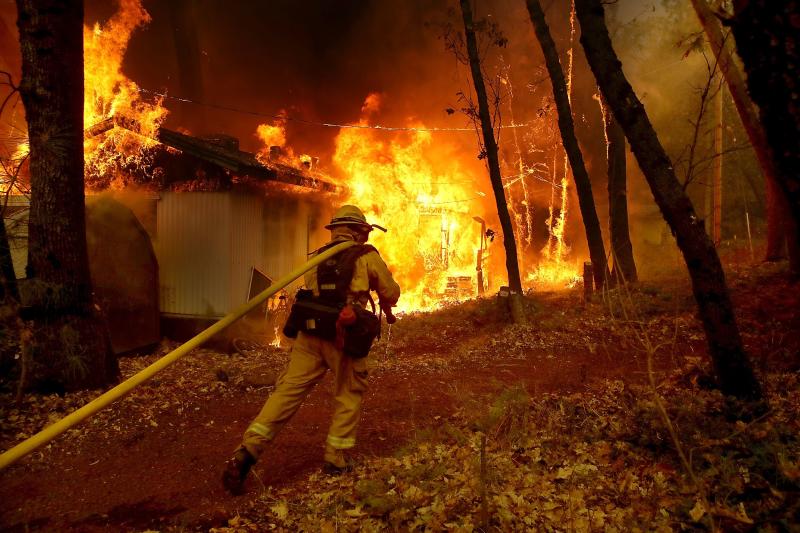Nations count cost of 2018 climate disasters as experts say CO2 emissions must be cut
Sign up now: Get ST's newsletters delivered to your inbox

A firefighter pulls a hose towards a burning home as a wildfire moves through the area in Magalia, California, on Nov 9, 2018.
PHOTO: AFP/GETTY IMAGES
PARIS (AFP) - Climate change-induced disasters cost nations at least US$100 billion (S$137 billion) in 2018, a watchdog said, warning that the spate of deadly wildfires, floods and superstorms was "a shadow" of things to come if greenhouse gas emissions aren't slashed.
This year is set to be the fourth hottest on record and, as planet-warming carbon dioxide and methane levels in the atmosphere continue to rise, extreme weather events such as the devastating blazes that destroyed swathes of California are likely to become far more common.
"2018 showed the catastrophic threat that climate change presents the world. And this was just a shadow of what would come if temperatures continue to rise," said Ms Kat Kramer, global climate lead for the Christian Aid group.
Her team compiled a list of 10 climate-linked disasters and used open source data, official estimates and assessments from insurance firms to determine the cost of each.
Collectively, the events left hundreds of people dead, including more than 200 killed in floods in Japan from late June to mid-July, 100 in the July wildfire near Athens in Greece, and 85 in the Camp Fire in California in November.
Topping the list of the most costly disasters in terms of damage were hurricanes Florence and Michael, which caused an estimated US$17 billion and US$15 billion worth of damage, respectively.
Michael was the strongest storm to hit the continental United States since 1969, and killed 45 people in the US and at least 13 in Honduras, Nicaragua and El Salvador.
Slow-moving Florence caused catastrophic flooding.
This month, nearly 200 nations agreed on a common rule book to implement the 2015 Paris climate accord, in which countries committed to limiting global temperature rises to well below 2 deg C and aim for 1.5 deg C if possible.
But major polluters including the US and Saudi Arabia disputed a landmark scientific report released in October that suggested nations must slash fossil fuel use by nearly half in a little over a decade to achieve the Paris goals.
"The only answer is for immediate global efforts to reverse the rise in emissions, to put the world on course for carbon neutrality by the middle of the century," Ms Kramer told Agence France-Presse.
The pledges finalised at the COP24 talks in Poland this month set Earth on a path towards 3 deg C warming - enough to displace hundreds of millions and tug at the fabric of society.
Ms Kramer said governments were still beholden to domestic audiences who rely on dirty energy to heat their homes and power their cars.
"Since much of the public's day-to-day life is based around using fossil fuels, governments are often unwilling to make the changes that would be needed to cut emissions."
This year, there was at least one major climate-induced disaster on every inhabited continent on Earth.
Christian Aid found that four events - including the California wildfires, drought in southern Europe and widespread flooding in Japan - cost at least US$7 billion each.
"The unprecedented floods, droughts, heatwaves, wildfires and superstorms we've seen in recent years - they are the face of climate change," said Dr Michael Mann, distinguished professor of atmospheric science at Penn State University.
"The world's weather is becoming more extreme before our eyes - the only thing that can stop this destructive trend from escalating is a rapid fall in carbon emissions."
Global carbon dioxide emissions from industry, power generation and transport are expected to reach another record this year, a study released earlier this month estimated, driven up by rising demand for oil, gas and coal, particularly in China and India.
Christian Aid said the damage estimates were likely to be far lower than the true cost of most disasters, as they often showed only insured losses and didn't account for lost productivity associated with closed or damaged businesses and homes.


